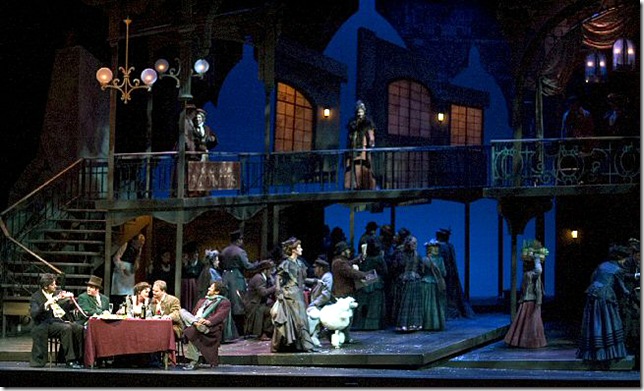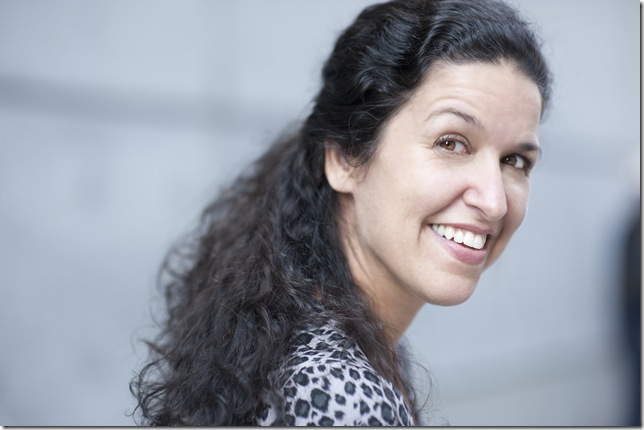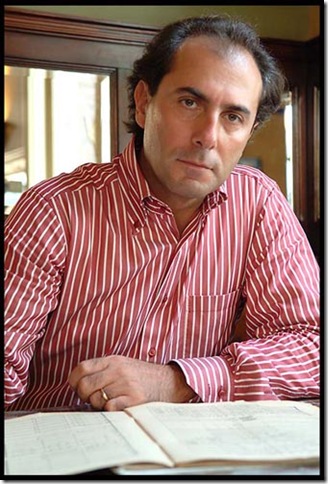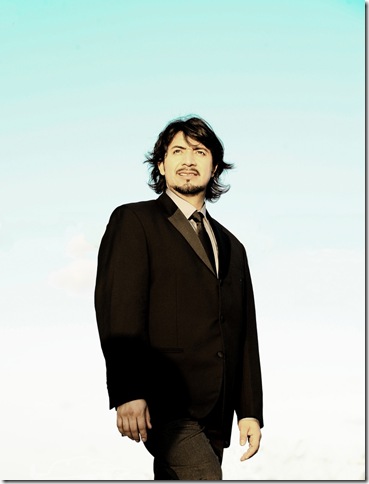If your task is to direct the most popular opera ever written, you might not have to stretch your conceptual-overhaul muscles all that much.
“It’s a traditional opera that’s OK to keep traditional. You don’t get bored with it,” said Fenlon Lamb, who is directing Giacomo Puccini’s La Bohème, Palm Beach Opera’s season opener.
“Coming to this and knowing it was going to be traditional is helpful for the first time you do it through, because you don’t have to think about any of the permutations. You have to think about the story line, you have to think about the connections between the characters,” she said. “And Puccini was a genius: He’s done it.”
La Bohème, the much-beloved tale of struggling artists and tragic love in the Paris of King Louis-Philippe, takes the stage at the Kravis Center tomorrow night and runs through Sunday afternoon. First performed in February 1896, the opera was almost immediately a worldwide success and made the 37-year-old Puccini a rich man. Based on a French novel (hence its French title) drawn from author Henri Murger’s own experiences, it tells the story of the doomed love of an aspiring young writer named Rodolfo and a tubercular seamstress named Mimi.
Their passionate but sad story is related amid the surroundings of a humble garret in the Latin Quarter, the bustle of the big city on Christmas Eve, and the environs of a café on the outskirts of town. Its four acts are relatively short, and it contains more wonderful melodies than most composers can spin out in a lifetime, which has been another of its chief selling points.
It served as the model for the hugely popular Jonathan Larson musical Rent, and has often been the introductory opera for newcomers to the art form. It is a simple melodrama that presents few if any comprehension problems to audiences seeing it for the first time, and its fourth act, in which Mimi dies amid her friends in the apartment where she found true love, is almost always accompanied by furtive, choked sobs in the seats.
“It is so accessible to us, every part of it,” said Lamb, 44, a mezzo-soprano who was a resident assistant director for Seattle Opera and is director of opera at the Bar Harbor Music Festival in Maine. “It’s just so human; it is the human experience. Also, it’s so wonderfully expressed, in the drama, in the music … Every single moment in the opera is something we can relate to.
“It gives you everything that you would want to come see in an opera. You get the spectacle, you get the intimacy, you get the deep feelings, you get the confusion, you get the catharsis at the end,” she said. “And every time you see it, it’s just like ‘Butterfly’: ‘I’ve seen this a lot, I’m not going to cry,’ and then: Boom.”
Palm Beach Opera, following its usual practice, has double-cast the two principal singers. Lake Park native Keri Alkema will sing Mimi on Friday night and Sunday afternoon opposite Dimitri Pittas as Rodolfo. On Saturday night, Eleni Calenos is Mimi and Anthony Kalil is Rodolfo. The role of Marcello, a painter, is sung by baritone Luis Ledesma for all three performances, while the role of his on-again, off-again lover, Musetta, is sung by Ellie Dehn.
Conducting the Palm Beach Opera Orchestra and chorus is the Italian conductor Daniele Callegari, making his debut with the company. Callegari studied at the Milan Conservatory, Puccini’s alma mater, and has made a specialty in recent years of conducting rarities such as Zandonai’s I Cavalieri di Ekebu and Chausson’s Le Roi Arthus. In March, he’ll be conducting Paul Dukas’s Ariane et Barbe-Bleu, the French composer’s magnum opus, for Opera du Rhin in Strasbourg.
Callegari, 54, gives several reasons for the opera’s seemingly permanent appeal.
“The power of this music is so strong, plus it’s a story of young people, a story of love,” he said, adding that the opera portrays this love with believability. “But most of all, Puccini has the power to enter your body and destroy your emotions.”
He does this with his gift for melody, but also with the integrated way the libretto and music work together; in Rodolfo’s Act I aria, “Che gelida manina,” for instance, as Rodolfo describes his occupation as a poet, the accompaniment throws off a busy figure, as if a new idea were just occurring to him, Callegari said.
Callegari said he pays strict attention to the libretto when putting an opera together, and indeed, when it’s time to start work on a new piece, he reads the libretto before getting to know the music.
“The libretto can suggest something already, even if you don’t read the music,” he said. “It means a lot if you can enter into the spirit of the drama. It gives you a starting point.”
He also said that it’s important in Bohème to make sure the orchestra doesn’t overwhelm the singers.
“I always try to have respect for the voices. I don’t want the audiences in the theater to think they are seeing an aquarium,” he said, making silent fish faces in which lips move but no sound comes out. “It’s important for there to be the right balance,” and in this case, that means an orchestra that’s playing quietly for the most part.
One of the singers he’ll be accompanying is Ledesma, originally an aspiring architect in his native Mexico City before deciding to pursue music. His long and varied résumé includes appearances at La Scala, Barcelona’s Opera Liceu, Houston Grand Opera and New York City Opera, among many others.
Although a supporting role, Marcello is a relatively large assignment that requires a singing actor who can believably play a man in the throes of a tempestuous relationship that turns into a shouting match at the end of Act III, but then gives him a tender lovelorn moment in a beautiful duet with Rodolfo in Act IV.
Ledesma, who sang Scarpia in Palm Beach Opera’s production of Puccini’s Tosca in 2007, said Marcello gives him plenty to work with, though if he and other baritones could go back in time, “we would ask Maestro Puccini to make us an aria,” he said.
Still, the character is able to develop, especially in the third act, when he commiserates with Mimi about Rodolfo’s jealousy and their difficult relationship.
“That’s a beautiful duet, with the two friends confronting these problems. In the case of Marcello, I don’t think he wants to betray Rodolfo. When Mimi is complaining to him, he is thinking, ‘I would love to help you, but — no,’” Ledesma said.
There are good reasons for Bohème’s continuing popularity, he said.
“The essence of ‘Bohème’ is pure romanticism, pure truth — because often we see with Marcello and Musetta, it’s ‘I love you but I hate you,’” he said, which is unlike the typical hero/villain duality of opera, but far more nuanced and much more believable.
But Ledesma said he thinks Musetta has grown tired of the Bohemian life, and soon the roommates will move on, too, from their poor but almost carefree days in the Latin Quarter.
“That’s something (Puccini) knew how to capture, the years from 18 to 22, 23. And those years are crucial in anybody … and I think that’s what Puccini did, and I think that’s why it’s so famous,” Ledesma said.
And there is the heartbreaking loss of Mimi, which brings their youths to an end.
For Lamb, the opera as a whole “is very honest, and I love that about it.”
“You can do different takes on it, and there are different character choices you can make. But there is just something so genuine about it, so honest and heartfelt,” she said.
La Bohème is set for performances at 7:30 p.m. Friday and Saturday, and 2 p.m. Sunday, at the Kravis Center’s Dreyfoos Hall. For tickets, call 833-7888 or visit www.pbopera.org.



